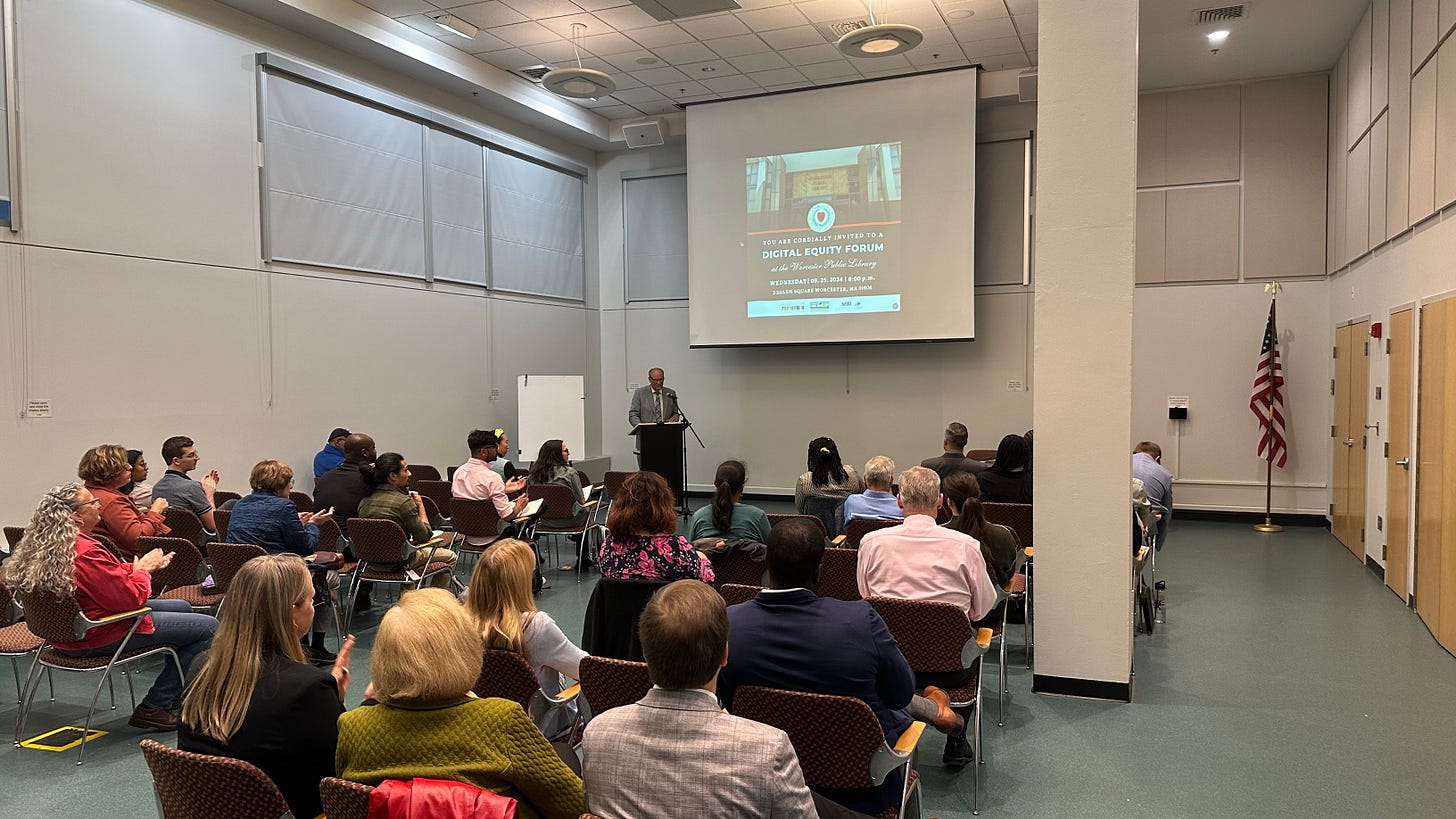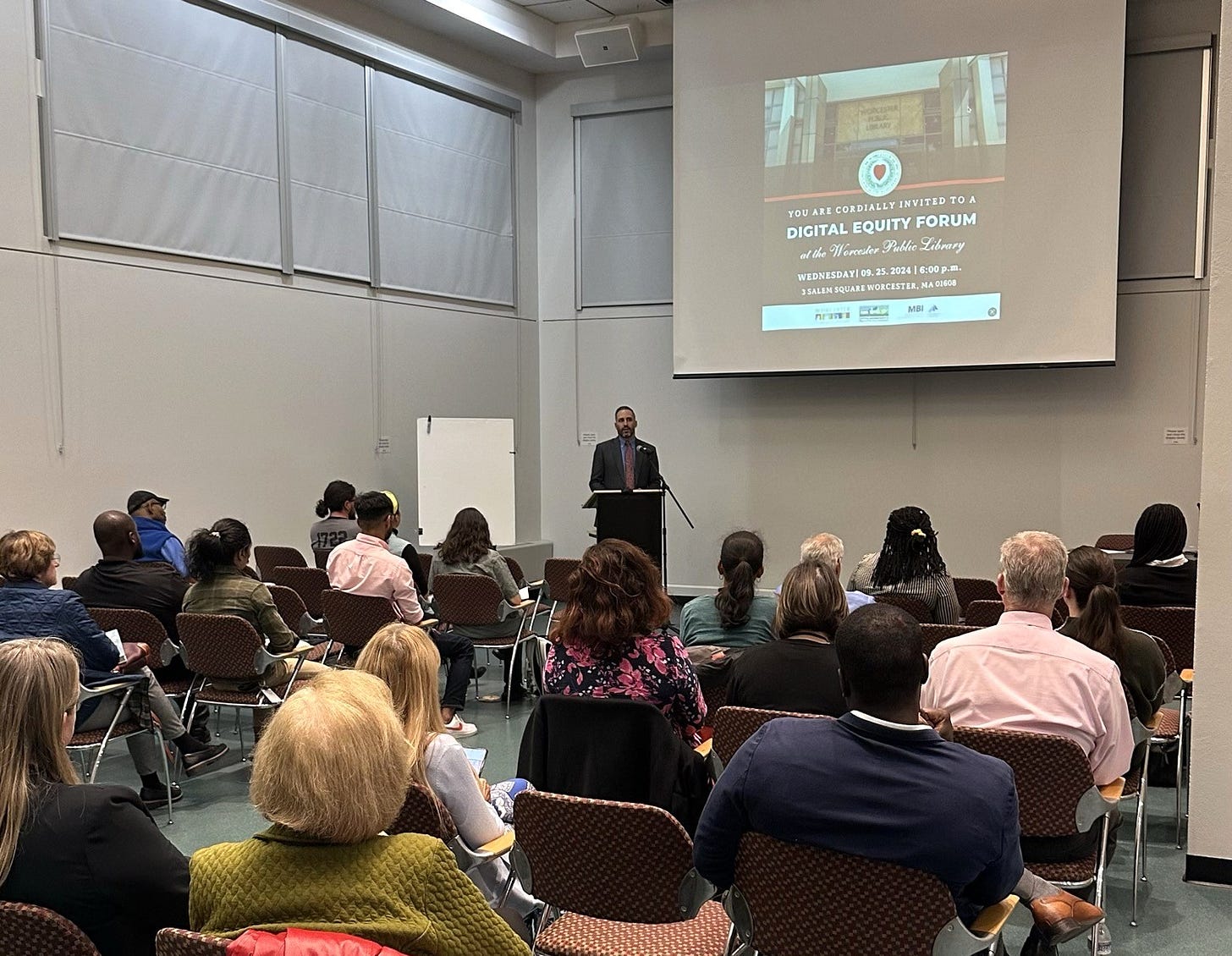Feature Stories: Worcester Public Library leads the push for digital equity

This post marks the launch of a new series on The Buzz Substack, Feature Stories. The series will highlight the work of municipal departments and their employees across the city. These posts will be written in the third person and will not be authored by the City Manager.
During the Digital Equity Forum on Sept. 25, it was clear attendees were invested in increasing internet access across the city. The forum, which started at 6 p.m., lasted until 8:20 p.m. when Worcester Public Library (WPL) Executive Director Jason Homer had to start wrapping things up because the library was closing in 10 minutes.
“Those who came to the forum were really engaged and interested in figuring out both their role [in achieving digital equity] as well as their ability to ask their library and their community to keep pushing forward,” Homer said.
The forum followed the release of the Central Massachusetts Regional Planning Commission (CMRPC)’s report, “Connecting Worcester,” which the group developed after the municipality was selected to participate in the Massachusetts Broadband Institute (MBI)’s Municipal Digital Equity Planning Program.
The report, released on July 16, was the product of four months of public workshops, gathering and analyzing demographic and broadband usage data, distributing community surveys, tabling at events, resource mapping, one-on-one interviews with community leaders, and convening the Worcester Digital Equity Working Group.
The process found that while more than 99.82% of households in the city have physical access to at least one broadband internet service provider, 12.2%, or 9,633 households, do not have an internet subscription of any kind.
To address that gap, the report illustrated opportunities for the municipality to advance digital equity initiatives relative to the affordability of home internet subscriptions, access to digital devices, language and age barriers to digital literacy, coordination between community organizations, and online safety.
Further, the report highlighted the central role that the Worcester Public Library will play in addressing digital equity in the city, as well as its current digital education opportunities.
Prior to the release of “Connecting Worcester,” the library was already proactively addressing digital equity, conducting 30 to 50 computer-based classes a month. These classes cover a wide range of topics, from the basics of using computers to advanced coding languages like Python. Most of the classes take place at the Main Library, the largest branch with a computer lab, but classes occasionally happen at the other branches, demonstrating the library’s commitment to reaching all corners of the community.
The municipality was recently awarded $100,000 from MBI to address digital equity. Once the library receives those funds, it can expand its existing programs and help further tackle the digital divide.
“We’re excited because this grant will allow us to build ourselves a mobile computer lab, so anywhere we bring a book mobile we can bring a mobile classroom…and that’ll help us expand the work that’s already being done,” Homer said. “We already have the lesson plans to teach you how to use Google, Google Drive, etc. and so we just need the means to go out and do that.”
The library already offers computer basics in Spanish, and the grant will allow them to hire individuals to teach digital literacy in all the dominant languages in Worcester and offer childcare for parents who are interested in taking the class.
Several organizations attended the digital equity workshops and forum the municipality held, including the Southeast Asian Coalition. Homer said the WPL will partner with the Southeast Asian Coalition and other organizations that work with at-risk or traditionally marginalized populations to bring the mobile computer lab directly to them.
The library will also use the money to double the number of hotspots available in its Library of Things, increasing people’s access to the internet.
However, the library and municipality recognize there is more work that can be done, and the library has applied to a multimillion-dollar grant that would help further expand its efforts and potentially get grants to specifically help people get affordable access to the internet in their homes. If the library received the grant, it would also help them staff a Digital Equity Department within the library.
“We’ll keep looking for funding opportunities to bring in digital equity work because this work is big and it’s important, and realistically the way that we’re going to be able afford what our community needs is to tap all the available resources we can,” Homer said.

The efforts the municipality is making toward digital equity have not gone unnoticed. MBI chose Worcester for the location of its event “Celebrating Digital Equity in Massachusetts: A Forum for Innovation and Collaboration” on Wednesday, Oct. 9 and chose Homer as its keynote speaker.
“For me, it really demonstrates a commitment from MBI to seeing success in Central Massachusetts,” Homer said. “Our communities in this area have long been left behind with digital equity…and to see the state really commit to not only inviting me, but also hosting this here in Worcester, is a signal of a shift that needs to happen so there’s a stronger focus on Central Massachusetts.”
The path forward on digital equity in Worcester will not be shaped solely by the municipality and the library. Community-led workshops and forums have highlighted numerous individuals and organizations eager to get involved. Their engagement is crucial for driving meaningful change.
“If we’re 10% of the way through and our community is giving us a new desire or a new mandate, we have built ourselves a nimbler system so we can actually respond to our community’s needs,” Homer said.


